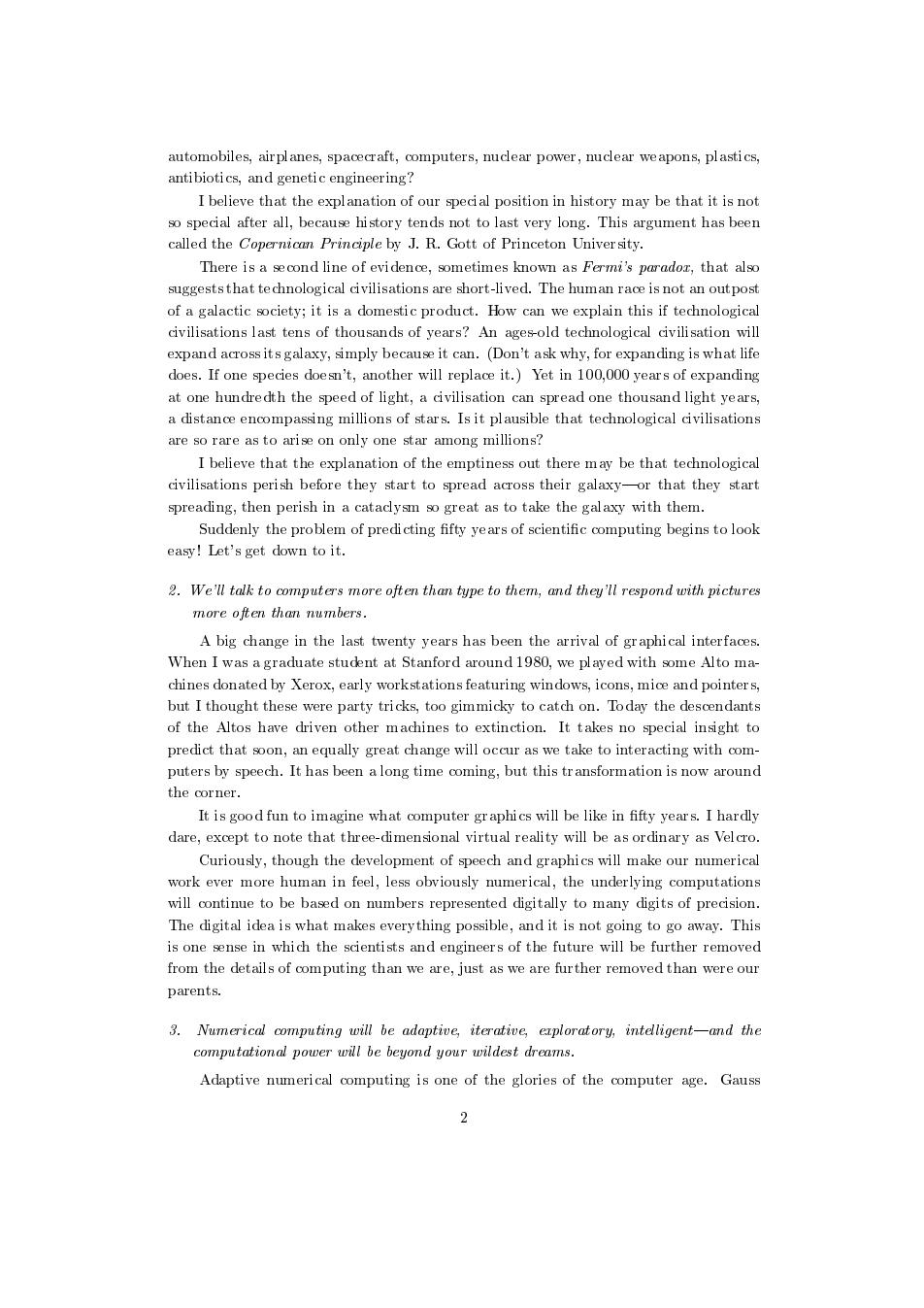正在加载图片...

automobiles,airplanes,spacecraft,computers,nudear power,mudear weapons,plastics, antibiotics,and genetic engineering? I believe that the explanation of our special position in history may be that it is not special after all,because history tends not to last very long.This argument has been called the Copernican Principle by J.R.Gott of Princeton University. There is a second line of evidence,sometimes known as Fermi's parador,that als suggeststhat tecnological civilisations are short-lived.The human race is not an outpost of a galactic society;it is a domestic product.How can we explain this if tecnological civilisations last tens of thousands of years?An ages-old technological civilisation wil expand across its galaxy,simply because it can.(Don't ask why,for expanding is what ht does.If or doe sn't,an will replace it.Yet in 100,000 years o of light spread one t nd li t years sing million sar&Isit I lbethattecdhnologiealdisations are believe ot the emptiness out t here may be that e th to Spre galaxy they star spreac , eat as to ith e prob n of predicting fifty years of scien ie computing beginstoloo 2.We'll talk to computers more often than type to them,and they'll respond with pictures mnore o足n than numbers. last twenty years has bee When amord around 1980. m e pa f th A14 4 ge to int sp e山.tha ing.but this It is good fun toimagine what comp raphics will be like in fifty years I hardly ot to note that three-dimension virtual beas nhics till make The digital idea is what makes everythin ossible.and it is not going to to go vay from the details of computing than we are,just as we are further removed than were our parents. computing will be adaptive iterative,eploratory,intelligent-and the computational power will be beyond your wildest dreams. Adaptive numerical cmputing is one of the glories of the computer age.Gauss automobiles, airplanes, spacecraft, computers, nuclear power, nuclear weapons, plastics, antibiotics, and genetic engineering? I believe that the explanation of our special position in history may be that it is not so special after all, because history tends not to last very long. This argument has been called the Copernican Principle by J. R. Gott of Princeton University. There is a second line of evidence, sometimes known as Fermi's paradox, that also suggests that technological civilisations are short-lived. The human race is not an outpost of a galactic society; it is a domestic product. How can we explain this if technological civilisations last tens of thousands of years? An ages-old technological civilisation will expand across its galaxy, simply because it can. (Don't ask why, for expanding is what life does. If one species doesn't, another will replace it.) Yet in 100,000 years of expanding at one hundredth the speed of light, a civilisation can spread one thousand light years, a distance encompassing millions of stars. Is it plausible that technological civilisations are so rare as to arise on only one star among millions? I believe that the explanation of the emptiness out there may be that technological civilisations perish before they start to spread across their galaxy|or that they start spreading, then perish in a cataclysm so great as to take the galaxy with them. Suddenly the problem of predicting
fty years of scienti
c computing begins to look easy! Let's get down to it. 2. We'l l talk to computers more often than type to them, and they'l l respond with pictures more often than numbers. A big change in the last twenty years has been the arrival of graphical interfaces. When I was a graduate student at Stanford around 1980, we played with some Alto machines donated by Xerox, early workstations featuring windows, icons, mice and pointers, but I thought these were party tricks, too gimmicky to catch on. Today the descendants of the Altos have driven other machines to extinction. It takes no special insight to predict that soon, an equally great change will occur as we take to interacting with computers by speech. It has been a long time coming, but this transformation is now around the corner. It is good fun to imagine what computer graphics will be like in
fty years. I hardly dare, except to note that three-dimensional virtual reality will be as ordinary as Velcro. Curiously, though the development of speech and graphics will make our numerical work ever more human in feel, less obviously numerical, the underlying computations will continue to be based on numbers represented digitally to many digits of precision. The digital idea is what makes everything possible, and it is not going to go away. This is one sense in which the scientists and engineers of the future will be further removed from the details of computing than we are, just as we are further removed than were our parents. 3. Numerical computing wil l be adaptive, iterative, exploratory, intel ligent|and the computational power wil l be beyond your wildest dreams. Adaptive numerical computing is one of the glories of the computer age. Gauss 2